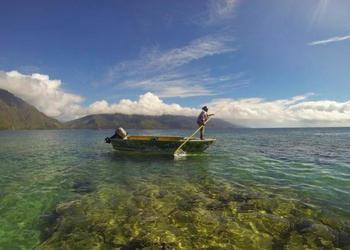
NOUMEA, New Caledonia, May 13, 2014 (ENS) – A vast expanse of pristine Pacific Ocean is now the world’s largest protected area under a new law passed by the government of New Caledonia creating the Natural Park of the Coral Sea.
Located 2,000 miles east of Australia in the Pacific Ocean, the Natural Park of the Coral Sea covers all of the French territory’s marine waters, extending 12 to 200 nautical miles from its coasts.

The Natural Park of the Coral Sea, or Le Parc Naturel de la Mer de Corail, came into existence in Noumea in late April. By legislative decree, New Caledonia President Harold Martin and the territory’s political leadership legally established the protected area.
The decree creates a multi-use, marine protected area which extends across 1.3 million square kilometers, an area three times the size of Germany, making it the largest protected area in the world.
The International Union for the Conservation of Nature, IUCN, says the new park includes more than 4,500 square kilometers of fishery-supporting coral reefs.
The deepest site in France, measured at 7919 meters deep, is part of the new park, whose deep sediment basins, seamounts and coral reefs host an extraordinary number of species.
Twenty-five species of marine mammals, 48 shark species, and five species of marine turtles swim through these newly protected waters and the park also shelters 19 species of nesting birds.
The archipelago, part of the Melanesia subregion, includes the main island of Grande Terre, the Loyalty Islands, the Chesterfield Islands, the Belep archipelago, the Isle of Pines, and a few remote islets.
New Caledonia is the world’s only stand-alone Biodiversity Hotspot, and its coastal waters hold the world’s largest lagoon, which has earned the territory UNESCO World Heritage Site status.
In the next phase of development, the levels of protection will be defined so that the Natural Park of the Coral Sea will become a multiple use area with different zones for economic activity and conservation.

The park’s ecosystems generate up to 3,000 tons of fish each year, providing food to New Caledonia’s quarter of a million people and an economic driver for the territory’s sustainable economy.
The Virginia-based nonprofit Conservation International has had a presence in New Caledonia for more than 12 years, working to develop and implement what the organization calls “integrated, sustainable solutions” on land and at sea.
“New Caledonians have always understood how much we depend upon nature – especially our oceans,” said Jean-Christophe Lefeuvre, Conservation International’s program director for New Caledonia.
“The careful and thoughtful management of natural resources is essential to long-term human well-being,” said Lefeuvre. “This legislation sends a powerful message that investing in the value nature can provide the basis for a healthy and sustainable society.”
“This is a monumental decision for New Caledonia and the entire Pacific,” said David Emmett, senior vice-president for Conservation International’s program in the Asia-Pacific.
“Such a measure exemplifies what other countries in the Pacific can do to fully invest in the long term health and productivity of their ocean resources,” he said.

Plans to create the park were first announced in at the Pacific Island Forum in 2012, when the New Caledonia government offered its first official commitment to the Pacific Oceanscape.
An unprecedented effort among 16 Pacific Island nations and six territories for collaborative management of nearly 40 million square kilometers, the Pacific Oceanscape represents 10 percent of the world’s total ocean surface.
Over the next three years, Conservation International experts in New Caledonia and the region will help the government shape the park’s spatial planning and management plan, fund key scientific research to inform that plan, and integrate New Caledonia’s contributions within the Pacific Oceanscape and Big Ocean Network.
Conservation International says the management plan will use best practices for integrated management and the protection of ecosystems, habitats and species. It will also strengthen monitoring strategies, preserve cultural values and work to increase international visibility.
The park increases French contributions toward the UN Convention on Biological Diversity for 2020 from four percent of the marine waters under French jurisdiction being protected, to 16 percent today.
Copyright Environment News Service (ENS) 2014. All rights reserved.
© 2014, Environment News Service. All rights reserved. Content may be quoted only with proper attribution and a direct link to the original article. Full reproduction is prohibited.
